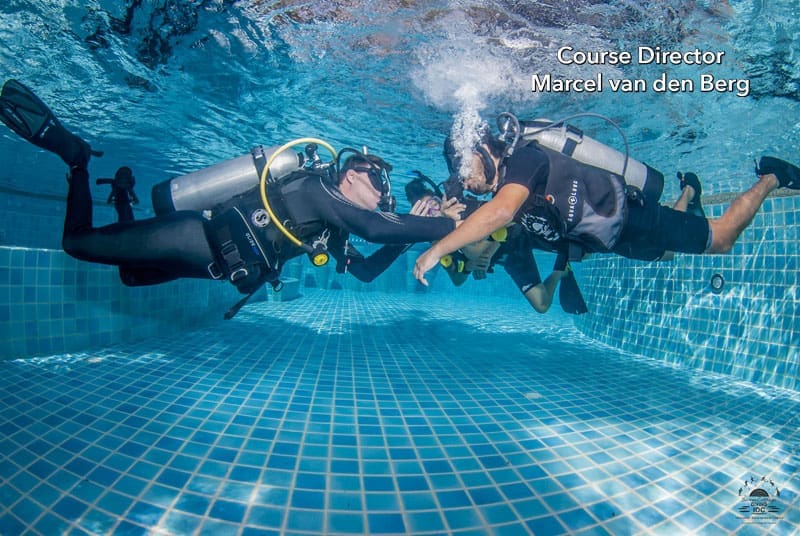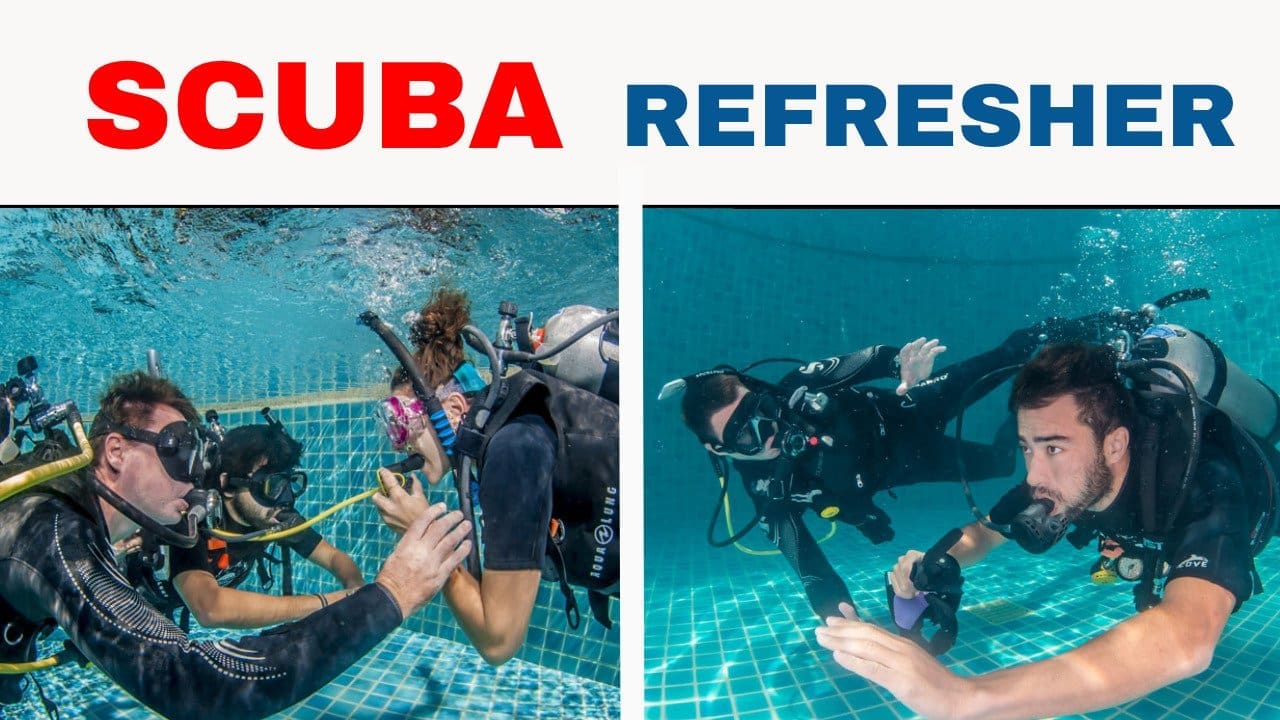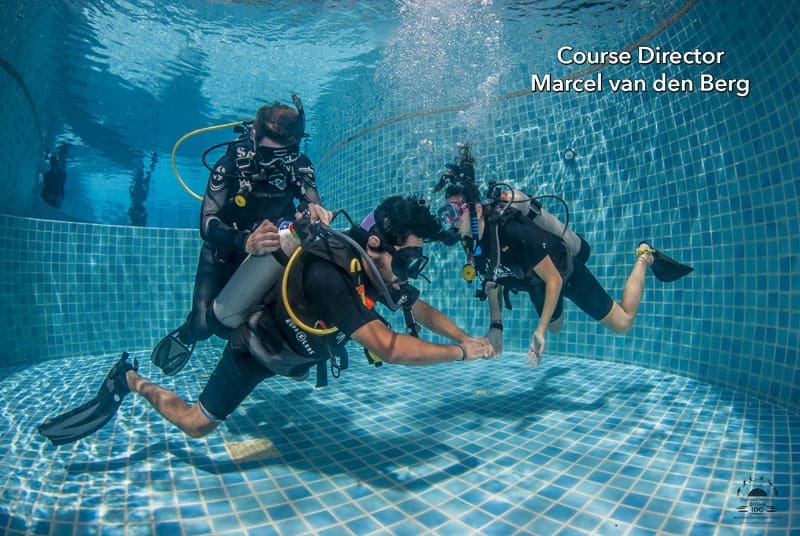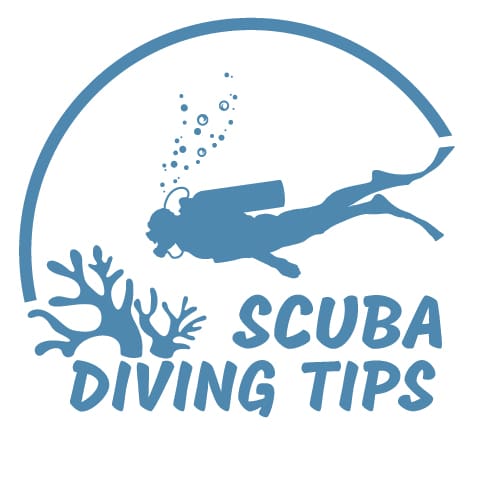Scuba Refresher Course is one of the best ways to get back to scuba diving comfortably. After some time of no scuba diving, you might feel a bit rusty and you would love to refresh yourself. The Scuba Refresher Course covers all the important scuba diving skills before your next scuba dive.
The Scuba Refresher Course is fantastic as it covers all the scuba diving training you had before. In this Scuba Refresher Course, you will review your scuba skills, scuba theory knowledge, and other scuba review topics to make sure you can comfortably and more importantly safely continuing diving.

You can prepare for your Scuba refresher dive theory by going over the PADI Open Water Diver manual answers of Chapter 1, Chapter 2, Chapter 3, Chapter 4 and Chapter 5 here.
Just remember that all this information is here to help you prepare. You should always take a scuba refresher with a certified Divemaster, Instructor and Dive Shop.
How often to do a scuba refresher?
When should I get my scuba diving certification refreshed or how often to do a scuba refresher are common questions asked. It depends on your scuba diving training organization what their standards are on how often you should do a scuba diving refresher course. This can be 6 months, 12 months, or even longer after your last scuba dive. It also depends on your experience level.
https://buymeacoffee.com/scubadivingtips
It also depends on your Dive shop’s own rules. Some dive shops are stricter than others. To be honest, I think you should always follow your dive training organization standards on how often you should do a scuba refresher course, but if they are not available then I recommend every 6 months with no scuba diving activity. In the end, it is about your safety, so why not be safe and do a scuba diving refresher course often.
How much does a scuba diving refresher course cost?
This depends on the location and the Dive shop, but in general, it is between 20 to 100 USD around the world. We have heard people complaining about the scuba diving refresher course cost as they just want to fun dive. However, a scuba refresher course can not only save your life, but it will make your scuba fun dive so much more enjoyable. There is no price tag to put on that. For only 20 to 100 USD you can feel safe, comfortable, and enjoy your dives after a period of no diving with an easy and fun scuba diving refresher course. That should be a no-brainer. The scuba diving refresher course is really valuable.

What skills are required for a scuba refresher course?
This also depends on your scuba training organization. Some organizations want you to repeat a strict amount of scuba skills during your refresher course while others are less strict and let you choose what scuba skills you would like to practice/repeat during your scuba diving refresher course. In our youtube video we cover most scuba skills that you might encounter in your scuba diving refresher course. Possible Scuba Diving Refresher Course Skills:
- Equipment setup
- Buddy check
- Giant Stride
- Weight check
- Snorkel to regulator exchange
- 5 Point descent
- Regulator recovery
- Mask removal and replacement
- Alternate air source swim and ascent
- Free flowing regulator
- Neutrally buoyant LPI
- Hover orally inflate
- CESA
- No mask swimming
- Weight belt removal underwater
- Scuba unit removal underwater
- Loose cylinder band
- Swim neutrally buoyant
- 5 Point ascent
- Weight belt removal surface
- Scuba unit surface
- Disconnect LPI
- Equipment disassembly

Should I refresh myself in confined water (swimming pool) or open water?
I recommend refreshing yourself first in confined water and if needed ask a Divemaster or Diving Instructor to refresh your scuba skills also in the open water. When you feel comfortable enough you can sign up for a fun dive again or continue your scuba diving education by joining the next course. For example, a lot of people only do the first open water diver course and then might need a scuba diving refresher course before they join the second advanced open water diver course.
If you are interested in doing a scuba diving refresher course with us then you can find more information here.
If you would like to teach a scuba refresher course you can become a Divemaster with us here.
or do your Diving Instructor (IDC Course) here.
Frequently Asked Questions About Scuba Refresher Courses
What is a scuba refresher course?
A: A scuba refresher course is designed for certified divers who haven’t been diving for a while and want to review essential skills and knowledge. It covers scuba theory, equipment setup, and in-water skills to ensure safety and confidence before resuming diving activities.
When should I take a scuba refresher course?
A: It’s recommended to take a scuba refresher course if you haven’t dived in 6 to 12 months. However, this can vary based on individual comfort levels and dive shop policies. Regular refreshers help maintain proficiency and ensure safety underwater.
What skills are reviewed in a scuba refresher course?
A: A typical scuba refresher course reviews fundamental skills such as mask clearing, regulator recovery, buoyancy control, and emergency procedures. The exact skills may vary depending on the dive shop and individual needs.
How long does a scuba refresher course take?
A: The duration of a scuba refresher course can vary but generally takes a few hours to half a day. It includes both theoretical review and practical in-water sessions to reinforce essential diving skills.
Is a scuba refresher course mandatory?
A: While not always mandatory, many dive shops require a refresher course if you’ve been inactive for an extended period. It’s a proactive step to ensure your safety and the safety of others during dives.


Leave a Reply